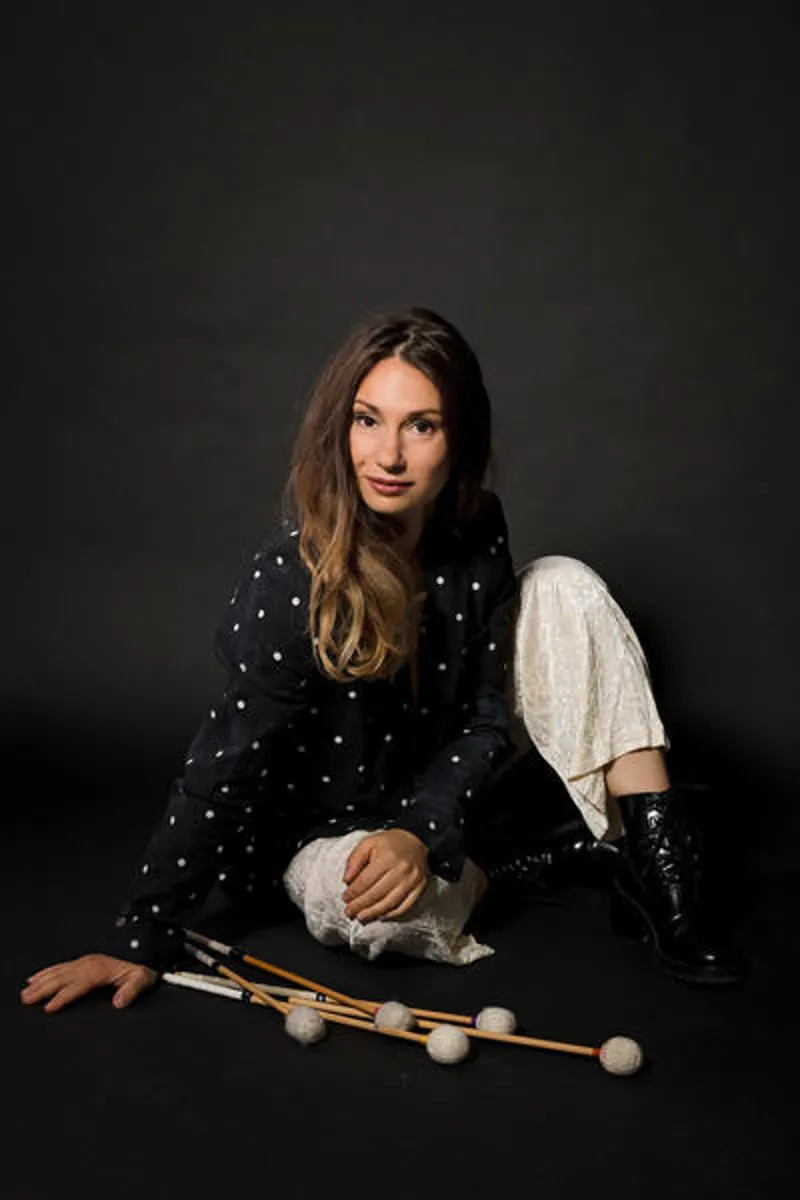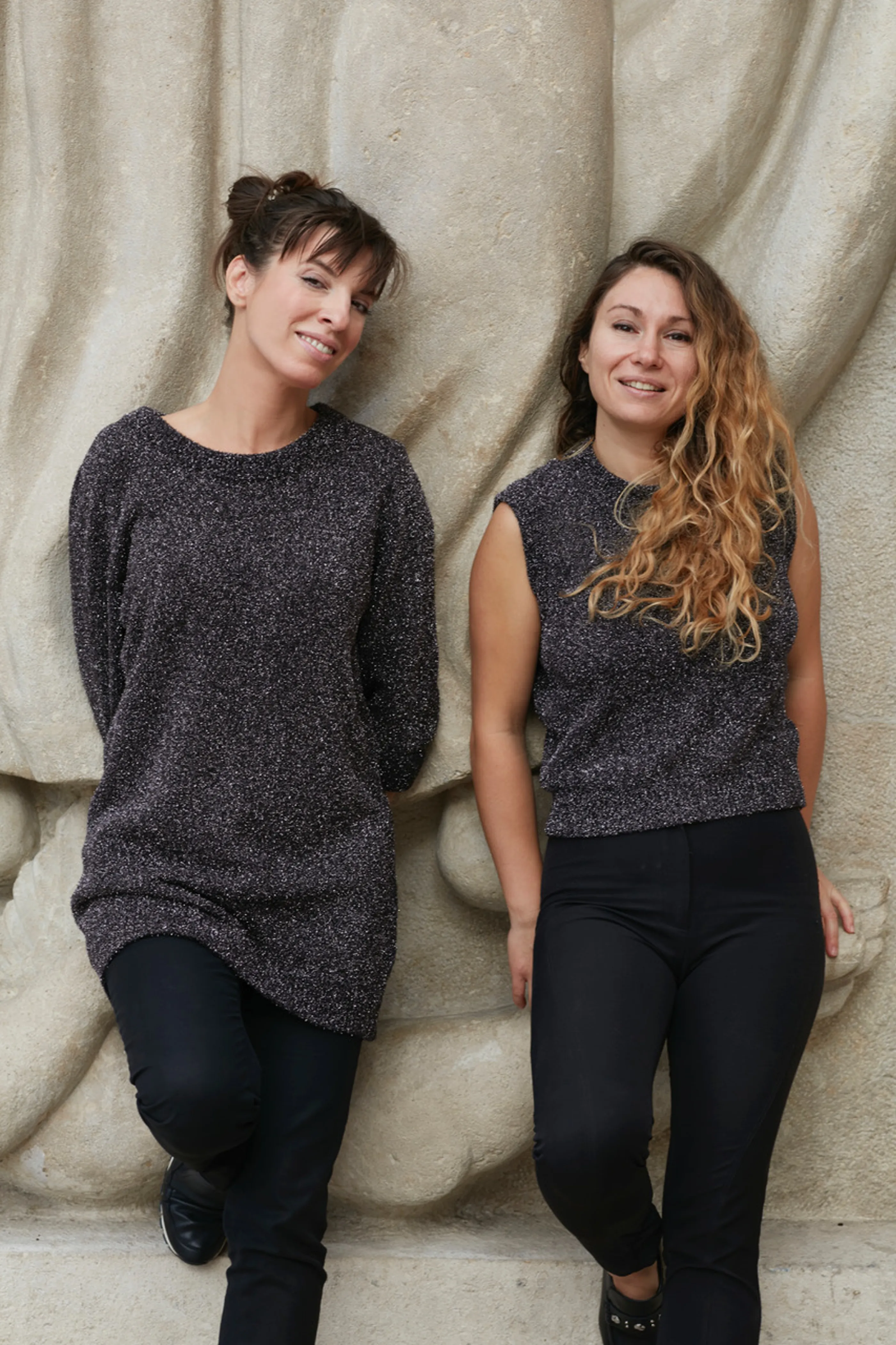
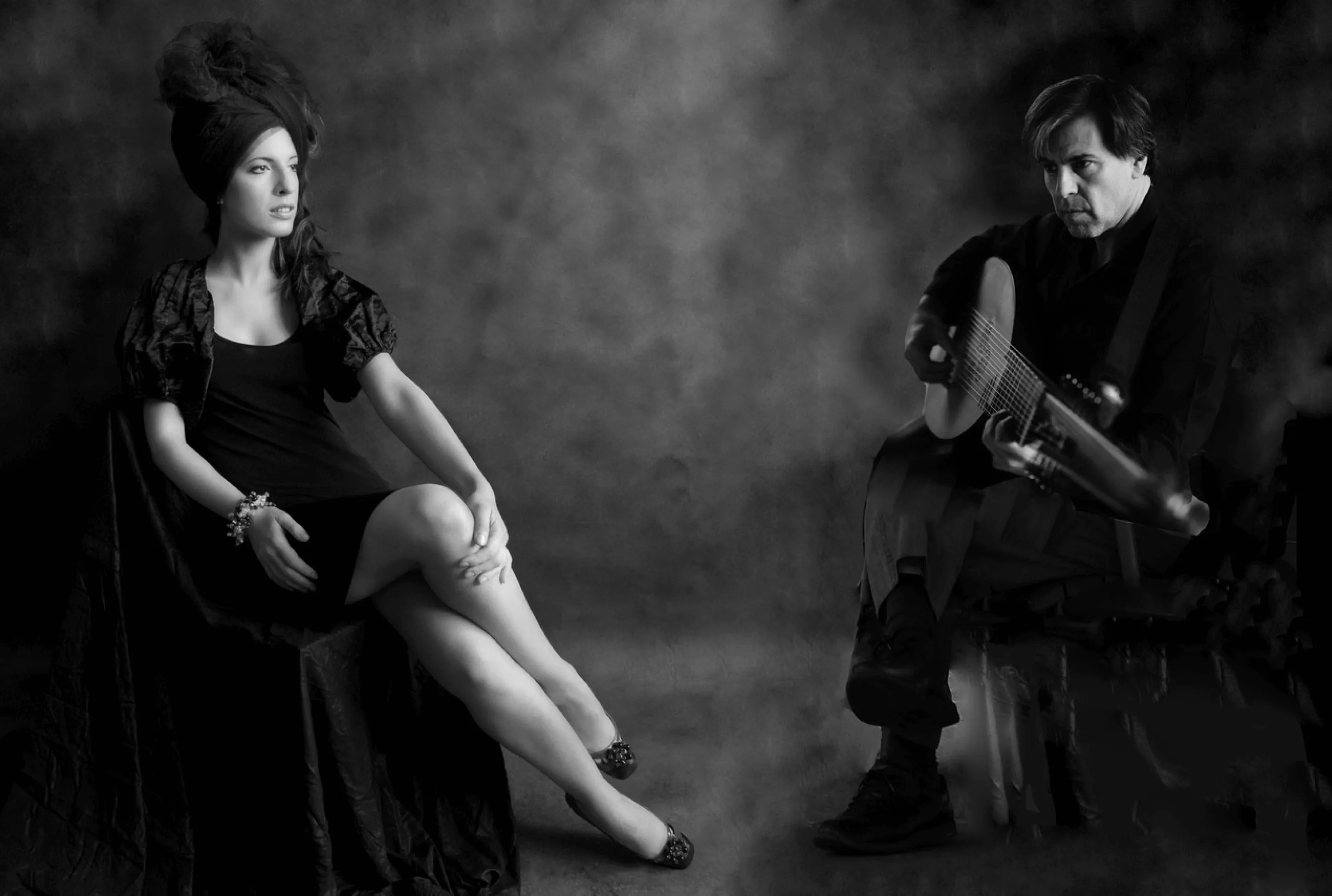
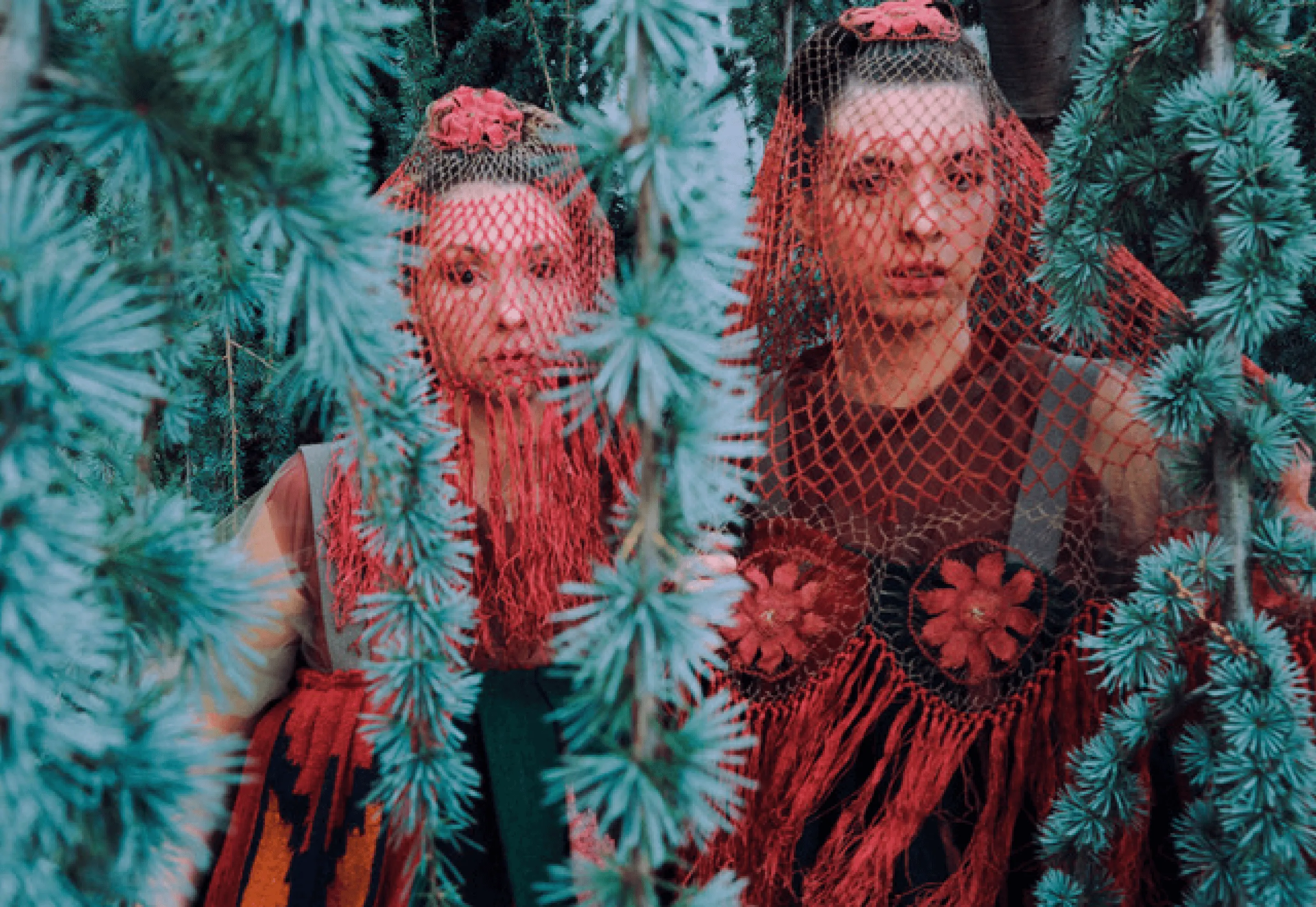
LA LINGUA
LA LINGUA DEL URSONATE
LA LINGUA
LA LINGUA DEL URSONATE
LA LINGUA
LA LINGUA DEL URSONATE
LA LINGUA
LA LINGUA
LA LINGUA
LA LINGUA
LA LINGUA DEL URSONATE
LA LINGUA
LA LINGUA DEL URSONATE
LA LINGUA
LA LINGUA DEL URSONATE
LA LINGUA
LA LINGUA DEL URSONATE
LA LINGUA
LA LINGUA DEL URSONATE
LA LINGUA
LA LINGUA DEL URSONATE
LA LINGUA, A COMPOSITION INSPIRED BY THE ORIGINAL URSONATE BY KURT SCHWITTERS
Premiere of composer Thomas Müller's work based on Kurt Schwitters' sound poem by Ina Kancheva (voice) and Vassilena Serafimova (percussion). With the contribution of Laurent Delforge (DJ) visual effects and Studio RAWLAB.
The singer Ina Kancheva has taken an interest in Kurt Schwitters' phonetic poem Ursonate, and has devised a program of its oral interpretation in public, with singing and musical accompaniment. Composer Thomas Müller, for his part, explored the same poem as part of the work of Schwitters (1887-1948), a key figure in twentieth-century modernist art who was branded a degenerate by the Nazis. A member of the Dada movement who became famous above all for his painting, sculpture, design, installation and collage work, the artist gradually freed himself to develop his own aesthetic. In his poetic work (he called himself a word artist), Schwitters sometimes reduced language to a series of vowels, consonants and syllables, presented in sequences akin to verses and musical rhythms, and intended for oral interpretation. Such is the case with his phonetic poem Ursonate, which takes 40 minutes to read.
This singular contribution is an integral part of the strong impulse to artistic creativity at the turn of the twentieth century, and has been emulated by contemporary sound poetics, which tend not only to replace the internalized assimilation of written texts, but also to employ a specific form of notation adapted to their sound interpretation.
In his composition "La Lingua de l'Ursonate", Thomas Müller experimented with an autonomous musical environment based on segments of Schwitters' phonetic poem, revealing, like the original poem, a total dissolution of semantic relationships. In so doing, he follows in the footsteps of Schwitters' pictorial art, whose revolutionary aspect is most apparent in his collage-paintings. The contemporary composer's intention is also to illustrate the eminently volatile nature of sound perceptions in the current context of accelerated conversion to digital technologies and Al, while poetics is still largely assimilated through the written word.
La Lingua is a musical composition performed against a backdrop of oral expression, singing and percussion. The program is enhanced by the powerful electronic contribution of DJ Laurent Delforge
Stimme und Schlagzeug - für ein solches Duo gibt es keine historischen Vorbilder. Da und dort in der Neuen Musik, im Jazz oder in den performativen Künsten, die auf Improvisation setzen, kommt die Konstellation vor. Feste Zweierensembles wird man jedoch so gut wie vergeblich suchen. Ina Kancheva und Vassilena Serafimova haben es gewagt. Klassisch ausgebildete Sängerin mit internationaler Bühnen- und Konzerterfahrung die eine, ARD-preisgekrönte Perkussionisten mit Soloauftritten weltweit die andere. Sie bringen eines mit: hohe Übereinstimmung in ihrem musikalischen Empfinden, verbunden mit absolutem künstlerischem Vertrauen zueinander - von der Perfektion ihres Könnens gar nicht zu sprechen. Das macht ihre Aufführungen vital und spannend. Sie reagieren im Augenblick des Konzerts sofort aufeinander, nehmen die Atmosphäre auf, tragen die Impulse weiter. So wird jeder Auftritt zu einem spezifischen Erlebnis, ob sie nun Werke vortragen, die eigens für sie und ihre besondere Musikalität geschrieben sind, oder Bearbeitungen überlieferten Repertoires, dem sie neue Nuancen und frische Emotionen abgewinnen, ob sie sich vom Temperament der Folklore oder vom Geist ihrer eigenen Virtuosität anregen lassen. Was sie musizieren, haben sie verinnerlicht und geben es in mitreißender Präsenz wieder. Ihre Programme stellen sie so zusammen, dass sie einen großen Spannungsbogen mit lebhaften Kontrasten schlagen. Im weiten Feld zwischen Liedprogrammen und performativen Projekten bieten sie ein differenziertes Spektrum an Repertoire und Darstellungsformen an. Geübten Konzertsängerinnen vermitteln sie frische Anregungen, den wenig Klassik-Affinen einen Einblick in die überwältigende Vielfalt konzertanter, virtuose, emotionaler Musik.
LA LINGUA, A COMPOSITION INSPIRED BY THE ORIGINAL URSONATE BY KURT SCHWITTERS
Premiere of composer Thomas Müller's work based on Kurt Schwitters' sound poem by Ina Kancheva (voice) and Vassilena Serafimova (percussion). With the contribution of Laurent Delforge (DJ) visual effects and Studio RAWLAB.
The singer Ina Kancheva has taken an interest in Kurt Schwitters' phonetic poem Ursonate, and has devised a program of its oral interpretation in public, with singing and musical accompaniment. Composer Thomas Müller, for his part, explored the same poem as part of the work of Schwitters (1887-1948), a key figure in twentieth-century modernist art who was branded a degenerate by the Nazis. A member of the Dada movement who became famous above all for his painting, sculpture, design, installation and collage work, the artist gradually freed himself to develop his own aesthetic. In his poetic work (he called himself a word artist), Schwitters sometimes reduced language to a series of vowels, consonants and syllables, presented in sequences akin to verses and musical rhythms, and intended for oral interpretation. Such is the case with his phonetic poem Ursonate, which takes 40 minutes to read.
This singular contribution is an integral part of the strong impulse to artistic creativity at the turn of the twentieth century, and has been emulated by contemporary sound poetics, which tend not only to replace the internalized assimilation of written texts, but also to employ a specific form of notation adapted to their sound interpretation.
In his composition "La Lingua de l'Ursonate", Thomas Müller experimented with an autonomous musical environment based on segments of Schwitters' phonetic poem, revealing, like the original poem, a total dissolution of semantic relationships. In so doing, he follows in the footsteps of Schwitters' pictorial art, whose revolutionary aspect is most apparent in his collage-paintings. The contemporary composer's intention is also to illustrate the eminently volatile nature of sound perceptions in the current context of accelerated conversion to digital technologies and Al, while poetics is still largely assimilated through the written word.
La Lingua is a musical composition performed against a backdrop of oral expression, singing and percussion. The program is enhanced by the powerful electronic contribution of DJ Laurent Delforge
LA LINGUA, A COMPOSITION INSPIRED BY THE ORIGINAL URSONATE BY KURT SCHWITTERS
Premiere of composer Thomas Müller's work based on Kurt Schwitters' sound poem by Ina Kancheva (voice) and Vassilena Serafimova (percussion). With the contribution of Laurent Delforge (DJ) visual effects and Studio RAWLAB.
The singer Ina Kancheva has taken an interest in Kurt Schwitters' phonetic poem Ursonate, and has devised a program of its oral interpretation in public, with singing and musical accompaniment. Composer Thomas Müller, for his part, explored the same poem as part of the work of Schwitters (1887-1948), a key figure in twentieth-century modernist art who was branded a degenerate by the Nazis. A member of the Dada movement who became famous above all for his painting, sculpture, design, installation and collage work, the artist gradually freed himself to develop his own aesthetic. In his poetic work (he called himself a word artist), Schwitters sometimes reduced language to a series of vowels, consonants and syllables, presented in sequences akin to verses and musical rhythms, and intended for oral interpretation. Such is the case with his phonetic poem Ursonate, which takes 40 minutes to read.
This singular contribution is an integral part of the strong impulse to artistic creativity at the turn of the twentieth century, and has been emulated by contemporary sound poetics, which tend not only to replace the internalized assimilation of written texts, but also to employ a specific form of notation adapted to their sound interpretation.
In his composition "La Lingua de l'Ursonate", Thomas Müller experimented with an autonomous musical environment based on segments of Schwitters' phonetic poem, revealing, like the original poem, a total dissolution of semantic relationships. In so doing, he follows in the footsteps of Schwitters' pictorial art, whose revolutionary aspect is most apparent in his collage-paintings. The contemporary composer's intention is also to illustrate the eminently volatile nature of sound perceptions in the current context of accelerated conversion to digital technologies and Al, while poetics is still largely assimilated through the written word.
La Lingua is a musical composition performed against a backdrop of oral expression, singing and percussion. The program is enhanced by the powerful electronic contribution of DJ Laurent Delforge
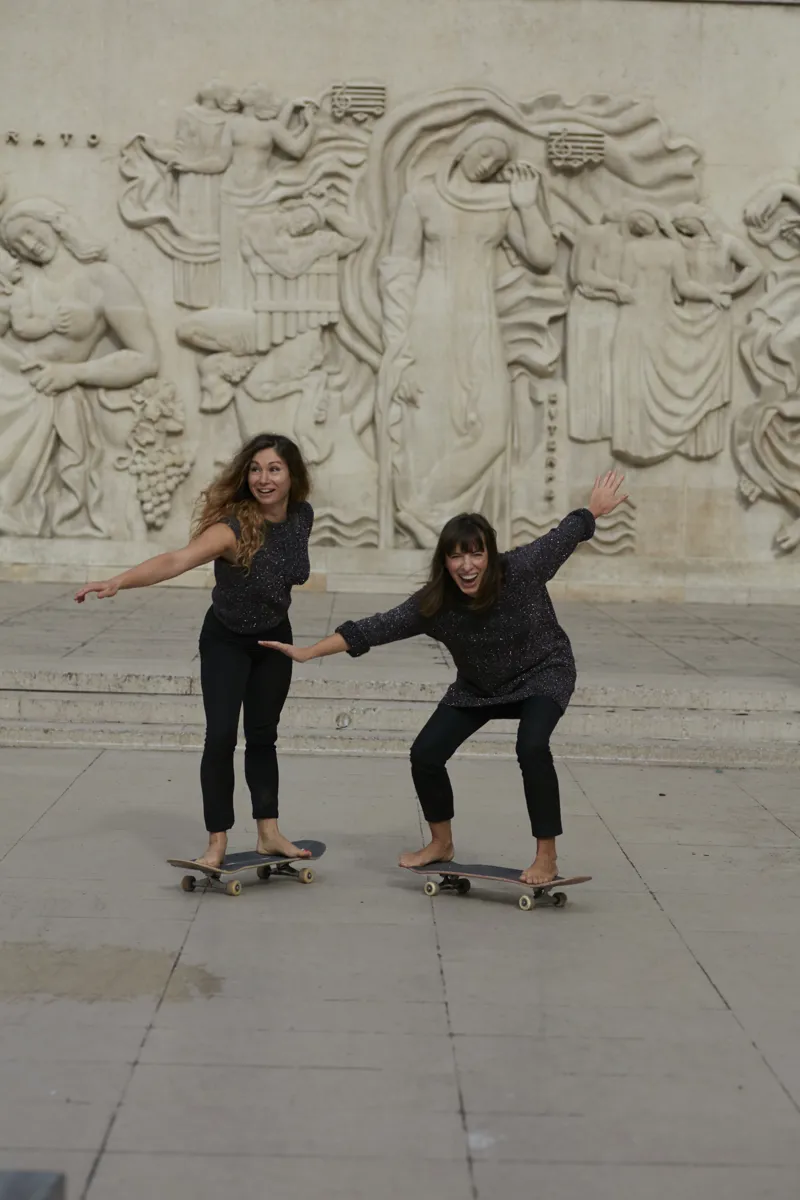
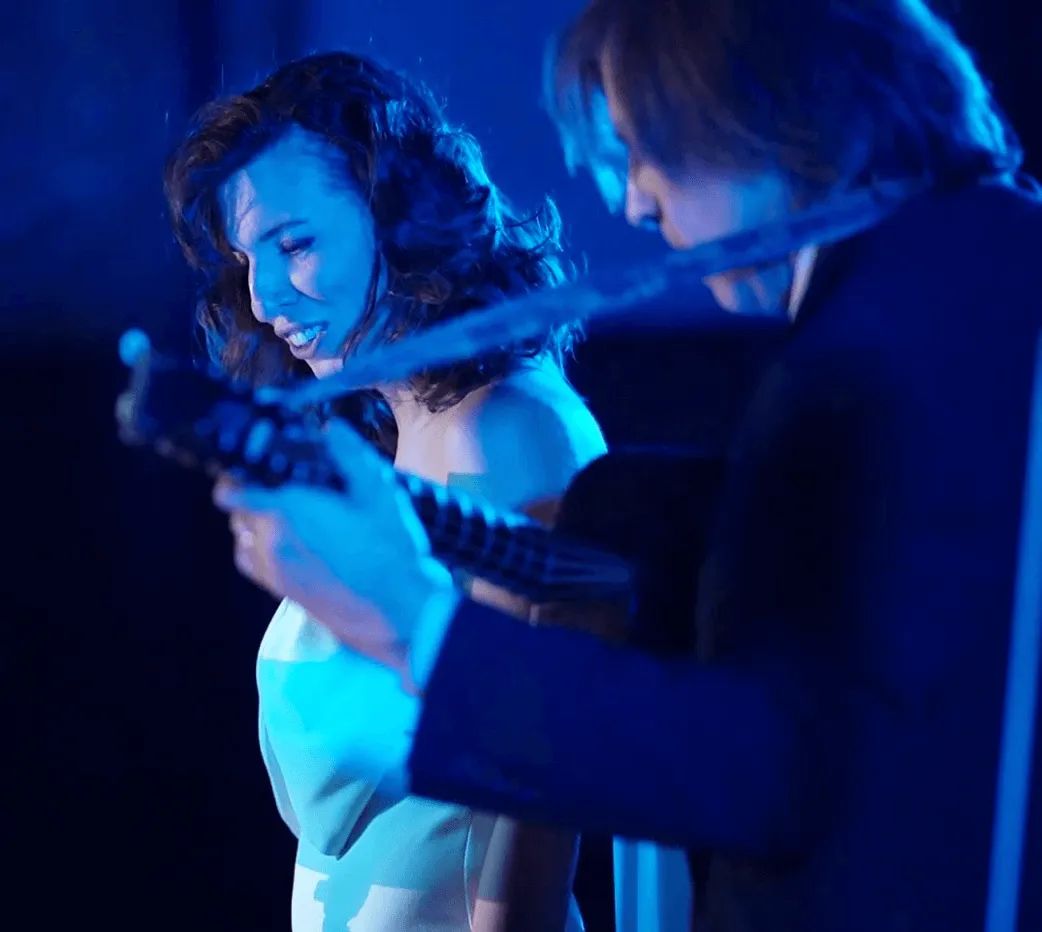
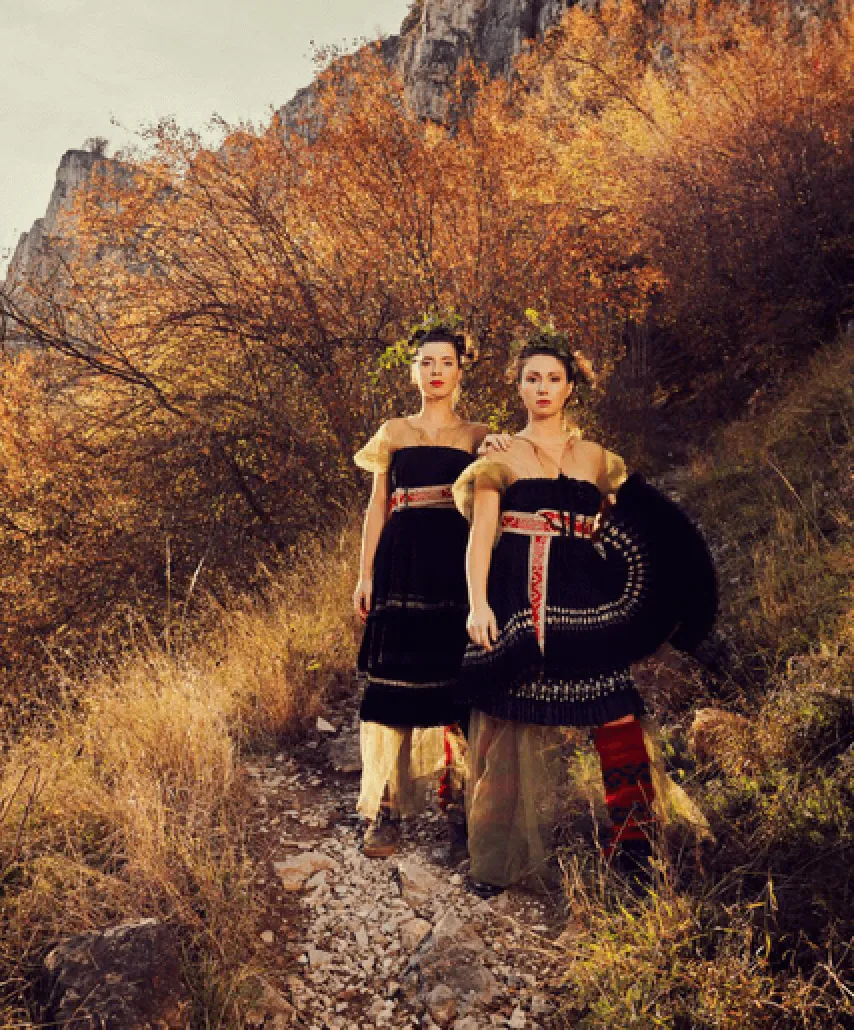
Voice and drums – there are no historical models for such a duo. This constellation occurs here and there in new music, jazz or in the performing arts that rely on improvisation. However, you will look in vain for permanent ensembles of two. Ina Kancheva and Vassilena Serafimova have dared to do it. One is a classically trained singer with big international stage and concert experience, the other an ARD award-winning percussionist with solo performances worldwide. They bring one thing with them: a high degree of agreement in their musical sensibilities, combined with absolute artistic trust in one another – not to mention the perfection of their skills. This makes their performances vital and exciting. They react to one another immediately at the moment of the concert, absorb the atmosphere and carry the impulses further. This makes every performance a specific experience, whether they are performing works that have been written especially for them and their particular musicality, or arrangements of traditional repertoires from which they extract new nuances and fresh emotions, whether they are inspired by the temperament of folklore or the spirit of their own virtuosity. They have internalized what they make and reproduce it with a rousing presence. They put together their programs in such a way that they create a great arc of tension with lively contrasts. In the wide field between song programs and performative projects, they offer a differentiated spectrum of repertoire and forms of presentation. They provide experienced concertgoers with fresh ideas, and those with little affinity for classical music an insight into the overwhelming variety of concert, virtuoso, emotional music.
This program focuses on the musical composition by Thomas Müller based on a phonetic poem by Kurt Schwitters, combined with other works from the 20th and 21st centuries from composers like Schönberg, Apergis among others.
LA LINGUA - NACH DER URSONATE VON KURT SCHWITTERS ist der Titel einer künstlerischen Performance, die tragende Elemente der MERZ-Ästhetik kompositorisch und szenisch-artistisch aufgreift, um sie offensiv, stilpluralistisch und experimentell weiterzuführen. In unserer gut einstündigen multimedialen Mega-Collage mit den Performern Ina Kancheva (Gesang), Vassilena Serafimova (Percussion) und DJ Laurent Delforge verbinden sich Originalkompositionen des 20. und 21. Jahrhunderts - Arnold Schönberg, Samuel Barber, Thomas Müller u.a. - mit Vokalklängen, Tönen von Schlaginstrumenten und elektronischen Beats zu einer szenisch-pantomimischen Interpretation.
Wie in einem großen akustischen Merzbild finden die heterogene Partikel, Klänge, Noten und phonetischen Bestandteile - für Schwitters war es das prinzipiell gleichberechtigte „Material" - zueinander. Dabei sind sie in dem szenisch-ästhetisch miteinander verbundenen Raum voneinander unterscheidbar und bis hin zu weichen Rändern von Verschmelzungen zugleich aufeinander bezogen. Neues provozieren sie nicht über die semantische Ebene, sondern durch direkte Konfrontation des Verschiedenen und aufeinander Bezugnehmenden. Diese Idee, unterschiedliches Material wie im Merzbau oder auf der Merzbühne zu akkumulieren, selbständig und in Schichten zusammenzuführen und in seinen Veränderlichkeiten zuzulassen, folgt Schwitters' dadaistischer Grundintention eines „verschmelzenden" Gesamtkunstwerks.
Ina Kancheva: Unsere Inspiration der Gesamtkonzeption entspringt unmittelbar Schwitters' legendärem Merzbau, der sich entsprechend der aufeinanderfolgenden Lebensstationen des Künstlers fortwährend dynamisch veränderte - eine Art abstrakter, begehbarer Collage aus Grotten, Säulen, Fundstücken, letztlich Umgebungen mit ständig wechselnder Gestalt und sich erweiternder Anordnung. Raumfüllend und wuchernd füllen sich im Merzbau die Wände so wie unterschiedlichste Möbel unaufhaltsam den Wohnraum in lonescos absurdem Theaterstück Der neue Mieter bevölkern. Hier steht das Material nicht mehr in der pragmatischen Funktion einer Wohnungseinrichtung, sondern ist ästhetisch aufgefasst als Quelle einer neuartigen, unvoreingenommenen Raumordnung mit möglichst vielen Gegenständen.
Unsere konzeptionelle Ausrichtung geht einerseits davon aus, dass wir diese sich verändernde Natur des Merzbaus mit Klängen und Anschaulichkeit nachempfinden und visuell denken, um die Vorstellungskraft zu entfesseln. Die Sprache, die Silben, die Klänge der Stimme können wie Echos von Schwitters' Collagen verstanden werden - wir assoziieren sie mit der Medienart ,Palimpsest', denn wie bei dieser Art von doppelbödiger , Durchschrift' akkumulieren wir Materialien, überschreiben sie neu, um Beziehungen zu schaffen, und auch das ist ein Grundgedanke der Merzkunst: „Beziehungen zu schaffen, am liebsten zwischen allen Dingen der Welt" (Schwitters).
Um andererseits einen nicht-abstrakten Bezug zu den „vorgefertigten" Materialien herzustellen, mit denen der Merzkünstler Schwitters seine Werke schuf, verwenden wir gefundenes Filmmaterial, digitalen Abfall oder Echtzeit-Videos unserer eigenen Bewegungen, während wir singen und performen. Das Holz der Marimba oder das Metall des Vibraphons und die Platten veranschaulichen Elemente, diese können ebenso gut aber auch der Stoff selbst sein, den wir dem Merzbau fortwährend hinzufügen, um die Visionen zu vermehren. Wir haben also diesen riesigen Werkzeugkasten an Perkussion in der Partitur, wie eine Art Kochküche mit einer Unmenge an Produkten und Gewürzen und Ausdrucksmitteln und Werkzeugen.
Voice and drums – there are no historical models for such a duo. This constellation occurs here and there in new music, jazz or in the performing arts that rely on improvisation. However, you will look in vain for permanent ensembles of two. Ina Kancheva and Vassilena Serafimova have dared to do it. One is a classically trained singer with big international stage and concert experience, the other an ARD award-winning percussionist with solo performances worldwide. They bring one thing with them: a high degree of agreement in their musical sensibilities, combined with absolute artistic trust in one another – not to mention the perfection of their skills. This makes their performances vital and exciting. They react to one another immediately at the moment of the concert, absorb the atmosphere and carry the impulses further. This makes every performance a specific experience, whether they are performing works that have been written especially for them and their particular musicality, or arrangements of traditional repertoires from which they extract new nuances and fresh emotions, whether they are inspired by the temperament of folklore or the spirit of their own virtuosity. They have internalized what they make and reproduce it with a rousing presence. They put together their programs in such a way that they create a great arc of tension with lively contrasts. In the wide field between song programs and performative projects, they offer a differentiated spectrum of repertoire and forms of presentation. They provide experienced concertgoers with fresh ideas, and those with little affinity for classical music an insight into the overwhelming variety of concert, virtuoso, emotional music.
This program focuses on the musical composition by Thomas Müller based on a phonetic poem by Kurt Schwitters, combined with other works from the 20th and 21st centuries from composers like Schönberg, Apergis among others.
Voice and drums – there are no historical models for such a duo. This constellation occurs here and there in new music, jazz or in the performing arts that rely on improvisation. However, you will look in vain for permanent ensembles of two. Ina Kancheva and Vassilena Serafimova have dared to do it. One is a classically trained singer with big international stage and concert experience, the other an ARD award-winning percussionist with solo performances worldwide. They bring one thing with them: a high degree of agreement in their musical sensibilities, combined with absolute artistic trust in one another – not to mention the perfection of their skills. This makes their performances vital and exciting. They react to one another immediately at the moment of the concert, absorb the atmosphere and carry the impulses further. This makes every performance a specific experience, whether they are performing works that have been written especially for them and their particular musicality, or arrangements of traditional repertoires from which they extract new nuances and fresh emotions, whether they are inspired by the temperament of folklore or the spirit of their own virtuosity. They have internalized what they make and reproduce it with a rousing presence. They put together their programs in such a way that they create a great arc of tension with lively contrasts. In the wide field between song programs and performative projects, they offer a differentiated spectrum of repertoire and forms of presentation. They provide experienced concertgoers with fresh ideas, and those with little affinity for classical music an insight into the overwhelming variety of concert, virtuoso, emotional music.
This program focuses on the musical composition by Thomas Müller based on a phonetic poem by Kurt Schwitters, combined with other works from the 20th and 21st centuries from composers like Schönberg, Apergis among others.
VASSILENA SERAFIMOVA
Born into a family of musicians in 1985, Vassilena Serafimova is the first Bulgarian percussionist to be awarded the Second Prize of the 56th ARD International Music Competition in Munich and the First Prize of the Fifth World International Marimba Competition in Stuttgart. She won the Grand Prix of the 10th International Competition Music and Earth as a soloist as well as the First Prize as a member of the Percussion Ensemble Accent, founded by her parents Avgustina and Simeon Serafimov. She received the Young Musician of the Year Award in Bulgaria in 2008 as well as the First Prize of the Music Critics in the 18th International Festival of Central Europe in Slovakia.
In 2014, Vassilena made her debut in Carnegie Hall of New York. One year later, together with Thomas Enhco (piano), she was the first marimba player in history to perform at the French Awards Ceremony Victoires de la Musique. In 2016, the duo recorded their first album titled Funambules for Deutsche Grammophon.
She has recorded for Radio France, Bayerischer Rundfunk, Bulgarian National Radio, and the Slovakian National Radio. Vassilena has performed as a soloist and chamber musician in Carnegie Hall, Alice Tully Hall (New York), Théâtre de Champs Elysées, Théâtre de Châtelet, Salle Pleyel (Paris), Hermitage Theater (Saint-Peterburg), Muziekgebouw (Amsterdam and Eindhoven), Herkulessaal (Munich), and Bulgaria Music Hall (Sofia). She has been invited to numerous festivals including Les Flâneries Musicales de Reims, Classique au Vert (France), Middelheim Jazz Festival (Belgique), REpercusionES (Costa Rica), Focus! 2011 Festival (Etats-Unis), and TransART (Bulgaria)). She has been invited to teach masterclasses in Europe, Central and North America, and Asia.
In 2013 Vassilena co-founded the Paris Percussion Group with Jean-Baptiste Leclère - a new ensemble of twelve percussionists uniting the young French generation of percussionists. She is also the artistic director and co-founder of the International Marimba And Percussion Festival in Bulgaria (2009, 2012, 2014).
Vassilena's inspiration, mentors and teachers include the following musicians: Simeon Serafimov, Sylvio Gualda, Keiko Abe, Bogdan Bacanu, Momoko Kamiya, Chantal Stigliani, Katarzyna Mycka, Michel Cerutti, Florent Jodelet, Gordon Gottlieb, Daniel Druckman, Tatiana Koleva, Nebojsa Zivkovic, Jeff Malarsky...
Her curious nature lead her to participate in the Pyxis transdisciplinary project, searching and discovering a dialog between different art forms. This complex work significantly developed her imagination and is reflected in her way of performing.
Vassilena performs on ADAMS Alpha Series Marimbas. She is a Zildjian artist since 2014, and has created her own marimba mallets series with Vibrawell Mallets France.
VASSILENA SERAFIMOVA
Vassilena Serafimova ist eine Perkussionistin, die am CNSMD in Paris und der Juilliard School in New York ausgebildet wurde, nachdem sie die Perkussionsklasse ihres Vaters in Bulgarien abgeschlossen hatte.
Sie gewann den zweiten Preis beim Internationalen ARD-Wettbewerb in München, den ersten Preis beim World International Marimba Wettbewerb in Stuttgart, den Grand Prix beim FMAJI in Frankreich und beim Internationalen Wettbewerb "Music And Earth" in Bulgarien. Sie wurde "Musikerin des Jahres 2008" in Bulgarien und gewann 2017 den zweiten Preis im Duo mit Thomas Enhco beim Kammermusikwettbewerb in Osaka, Japan.
Nach Einladungen zu Recitals und Meisterkursen in Europa, Mittelamerika, Nordamerika und Asien gab Vassilena 2014 ihr Debüt in der Carnegie Hall in New York. Ein Jahr später bringt sie im Duo mit dem Jazzpianisten Thomas Enhco die Marimba zum ersten Mal bei den Victoires de la musique classique in Frankreich zu Gehör.
Als künstlerische Leiterin des Internationalen Marimba- und Percussion-Festivals in Bulgarien und Co-Direktorin der Paris Percussion Group setzt sie sich für das Repertoire der Percussion auf der ganzen Welt ein.
Im Jahr 2017 bildet Vassilena ein neuartiges Duo mit der Elektro-Musikproduzentin Chloé. Die beiden Musikerinnen wurden 2017 zur Zusammenarbeit rund um das Werk von Steve Reich in der Reihe Variations eingeladen und machten sich einige Monate später auf, um im Studio VENEZIA von Xavier Veilhan ein neues Repertoire zu erforschen. Seitdem hat das Duo seine eigene musikalische Grammatik entwickelt und plant, in Kürze die CD Sequenza zu veröffentlichen.
Vassilena vertritt die Firmen Adams Musical Instruments und Avedis Zildjian Compagny und hat bei Vibrawell Mallets eine eigene Serie von Schlegeln entworfen. Die erste Funambules-CD im Duo mit Thomas Enhco erschien bei Deutsche Grammophon, ihre zweite - Bach Mirror - bei SONY Classics im März 2021.
Vassilena unterrichtet an der Haute Ecole de Musique in Lausanne und am Conservatoire Maurice Ravel in Paris.
Sie spielt Adams Alpha Series Marimbas und Vibrawell Mallets (die nach ihr benannte Serie).
VASSILENA SERAFIMOVA
Born into a family of musicians in 1985, Vassilena Serafimova is the first Bulgarian percussionist to be awarded the Second Prize of the 56th ARD International Music Competition in Munich and the First Prize of the Fifth World International Marimba Competition in Stuttgart. She won the Grand Prix of the 10th International Competition Music and Earth as a soloist as well as the First Prize as a member of the Percussion Ensemble Accent, founded by her parents Avgustina and Simeon Serafimov. She received the Young Musician of the Year Award in Bulgaria in 2008 as well as the First Prize of the Music Critics in the 18th International Festival of Central Europe in Slovakia.
In 2014, Vassilena made her debut in Carnegie Hall of New York. One year later, together with Thomas Enhco (piano), she was the first marimba player in history to perform at the French Awards Ceremony Victoires de la Musique. In 2016, the duo recorded their first album titled Funambules for Deutsche Grammophon.
She has recorded for Radio France, Bayerischer Rundfunk, Bulgarian National Radio, and the Slovakian National Radio. Vassilena has performed as a soloist and chamber musician in Carnegie Hall, Alice Tully Hall (New York), Théâtre de Champs Elysées, Théâtre de Châtelet, Salle Pleyel (Paris), Hermitage Theater (Saint-Peterburg), Muziekgebouw (Amsterdam and Eindhoven), Herkulessaal (Munich), and Bulgaria Music Hall (Sofia). She has been invited to numerous festivals including Les Flâneries Musicales de Reims, Classique au Vert (France), Middelheim Jazz Festival (Belgique), REpercusionES (Costa Rica), Focus! 2011 Festival (Etats-Unis), and TransART (Bulgaria)). She has been invited to teach masterclasses in Europe, Central and North America, and Asia.
In 2013 Vassilena co-founded the Paris Percussion Group with Jean-Baptiste Leclère - a new ensemble of twelve percussionists uniting the young French generation of percussionists. She is also the artistic director and co-founder of the International Marimba And Percussion Festival in Bulgaria (2009, 2012, 2014).
Vassilena's inspiration, mentors and teachers include the following musicians: Simeon Serafimov, Sylvio Gualda, Keiko Abe, Bogdan Bacanu, Momoko Kamiya, Chantal Stigliani, Katarzyna Mycka, Michel Cerutti, Florent Jodelet, Gordon Gottlieb, Daniel Druckman, Tatiana Koleva, Nebojsa Zivkovic, Jeff Malarsky...
Her curious nature lead her to participate in the Pyxis transdisciplinary project, searching and discovering a dialog between different art forms. This complex work significantly developed her imagination and is reflected in her way of performing.
Vassilena performs on ADAMS Alpha Series Marimbas. She is a Zildjian artist since 2014, and has created her own marimba mallets series with Vibrawell Mallets France.
VASSILENA SERAFIMOVA
Born into a family of musicians in 1985, Vassilena Serafimova is the first Bulgarian percussionist to be awarded the Second Prize of the 56th ARD International Music Competition in Munich and the First Prize of the Fifth World International Marimba Competition in Stuttgart. She won the Grand Prix of the 10th International Competition Music and Earth as a soloist as well as the First Prize as a member of the Percussion Ensemble Accent, founded by her parents Avgustina and Simeon Serafimov. She received the Young Musician of the Year Award in Bulgaria in 2008 as well as the First Prize of the Music Critics in the 18th International Festival of Central Europe in Slovakia.
In 2014, Vassilena made her debut in Carnegie Hall of New York. One year later, together with Thomas Enhco (piano), she was the first marimba player in history to perform at the French Awards Ceremony Victoires de la Musique. In 2016, the duo recorded their first album titled Funambules for Deutsche Grammophon.
She has recorded for Radio France, Bayerischer Rundfunk, Bulgarian National Radio, and the Slovakian National Radio. Vassilena has performed as a soloist and chamber musician in Carnegie Hall, Alice Tully Hall (New York), Théâtre de Champs Elysées, Théâtre de Châtelet, Salle Pleyel (Paris), Hermitage Theater (Saint-Peterburg), Muziekgebouw (Amsterdam and Eindhoven), Herkulessaal (Munich), and Bulgaria Music Hall (Sofia). She has been invited to numerous festivals including Les Flâneries Musicales de Reims, Classique au Vert (France), Middelheim Jazz Festival (Belgique), REpercusionES (Costa Rica), Focus! 2011 Festival (Etats-Unis), and TransART (Bulgaria)). She has been invited to teach masterclasses in Europe, Central and North America, and Asia.
In 2013 Vassilena co-founded the Paris Percussion Group with Jean-Baptiste Leclère - a new ensemble of twelve percussionists uniting the young French generation of percussionists. She is also the artistic director and co-founder of the International Marimba And Percussion Festival in Bulgaria (2009, 2012, 2014).
Vassilena's inspiration, mentors and teachers include the following musicians: Simeon Serafimov, Sylvio Gualda, Keiko Abe, Bogdan Bacanu, Momoko Kamiya, Chantal Stigliani, Katarzyna Mycka, Michel Cerutti, Florent Jodelet, Gordon Gottlieb, Daniel Druckman, Tatiana Koleva, Nebojsa Zivkovic, Jeff Malarsky...
Her curious nature lead her to participate in the Pyxis transdisciplinary project, searching and discovering a dialog between different art forms. This complex work significantly developed her imagination and is reflected in her way of performing.
Vassilena performs on ADAMS Alpha Series Marimbas. She is a Zildjian artist since 2014, and has created her own marimba mallets series with Vibrawell Mallets France.
